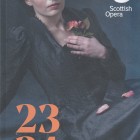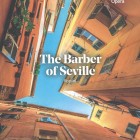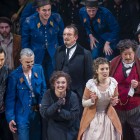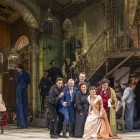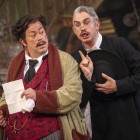Barbiere di Siviglia 2023Scottish Opera
Read more about the opera Barber of Seville
Sir Thomas Allen rarely worked with Scottish Opera during his singing career but has fortunately, at least to some extent, made up for that absence since he took to directing. This Barber staging was his first production for the company in 2007, with a revival in 2011.
Meantime he has added three equally successful stagings of Mozart operas. All four works have roles in which he appeared frequently in the world's great houses. In his Scottish Opera productions he has been able to reveal his detailed knowledge of them from the inside.
Fortunately Allen returned in person to supervise this revival and the team of young singers must all have gained enormously from his huge experience. Figaro is a role he first sang with Welsh National right at the start of his career in 1971, and by 1975 he was singing the role at Covent Garden and elsewhere.
In the dozen years since we last saw it, Sir Thomas has rethought some details of his production. There was a wonderful sense of freshness from the opening notes onwards. We are not usually a fan of today's obsession with providing frenetic action during an overture, but all is forgiven in this case, with a detailed sequence of mimes involving Fiorello and his chorus showing Seville gradually coming to life at dawn. We even see a window cleaner bringing a ladder on stage, usefully to hand for the planned escape at the end of the opera.
Simon Higlett's designs remain highly effective, with an authentic Hispanic tang - the direct influence was said to be Havana (Cuba) rather than urban Spain. Costumes - late 19th century in style - also look ideal. Given the significant lapse of time since the last revival, it can be assumed that many audience members at the third performance were seeing the work for the first time. The idea of having a Sunday matinee is an excellent one, and the queue for admission at that performance stretched the length of the Theatre Royal in Hope Street. Those encountering opera for the first time should have had a positive experience. Certainly the reception was extremely enthusiastic.
It has been a while since Scottish Opera mounted any Rossini, but Stuart Stratford has already shown that the bel canto repertoire suits him beautifully. This overture began crisply and very fleet of foot, with a lovely light touch and some beautiful solos. At the Theatre Royal. the pit was raised almost to stalls level, with no players buried under the stage, and the wind section was placed at the extreme left. Perhaps that occasionally led to a little shrillness at climaxes, but that is easily sorted.
The Australian baritone Samuel Dale Johnson had a great success with Scottish Opera before the interruption by Covid in Le nozze di Figaro, Pagliacci and Eugene Onegin. He has since gained further experience in Berlin, under Donald Runnicles at the Deutsche Oper, though he has not yet visited Edinburgh with them. His barber was ideally lively and sympathetic, dancing around the stage in a winning performance.
Company debutante Simone McIntosh was a very welcome arrival as Rosina. A Canadian mezzo currently working in Switzerland, she made a highly positive impression in this year's Cardiff Singer of the World competition, both in the operatic section and in the song contest, where she reached the final. Her acting abilities now came to the fore in a lovely performance, and she also had the full contralto lower range that so many of Rossini's leading ladies require.
Count Almaviva is in the safe hands of Anthony Gregory. He is comfortable with all the role's vocal difficulties (though he doesn't give us the Count's final aria ''Cessa di più resistere'', and avoids any temptation to overdo things in his cameos as drunken officer and substitute music teacher. He maintains sympathy for the character at all times.
David Stout is in full control of the farcical elements of Doctor Bartolo's role and is clearly a master of the rapid patter. He even managed to project some moments of pathos. John Molloy made an ideally lugubrious Basilio, tall, slender and cadaverous, with beautifully projected low notes.
Two of Scottish Opera's current crop of Emerging Arists made a positive impression. Inna Husieva made a meal of her little aria di sorbetto, breaking character to take an exravagant solo bow and popping out her important high notes in the first act finale. Ross Cumming dominated the opening minutes as Fiorello and returned, visibly transformed, as the officer of the watch,
A second visit, this time to the Edinburgh matinee, enjoyed a performance of, if anything, even higher quality than that of a fortnight before. The Festival Theatre is a good bit bigger than the Theatre Royal, but the performers filled the space with ease, both vocally and dramatically. The end of each act was greeted by the packed house with a spontaneous roar of approval that is rarely heard. And it was good to see that the audience seemed younger than usual.
It all started with the fizzing performance Stuart Stratford drew from the orchestra - and the first act finale was taken at a hair-raising speed that really kept the singers on their toes. It was also possible to notice little details that had crept past before - even the newspaper Ambrogio has his nose buried in during that first finale is Le Figaro. In Seville? - Why ever not?
Simone McIntosh continued to provide a lovely interpretation of Rosina with immaculate coloratura and a real twinkle to her comedy. Samuel Dale Johnson, Anthony Gregory and David Stout were still near ideal interpreters.
The single cast change came in the part of Don Basilio, now taken by Emyr Wyn Jones, who slotted into the staging quite seamlessly.
This was altogether an exhilarating performance that must have made many new friends for the opera.
The first two runs of this production were delivered in Italian. This time the witty and idiomatic English version by the late Amanda Holden, an excellent translator, is used, along with English supertitles. The words are delightfully witty and all the soloists produce wonderfully clear diction. A visit to Newcastle on 2 November to catch Opera North's new Falstaff staging confirmed that she was a great talent whose translating work is of superb quality. She will be much missed.
An innovation on the supertitle front was apparent during the final curtain calls. As each artist took their bow the role and singer were projected, beginning with the chorus and ending with the orchestra. The roars of approval therefore seemed that bit more personal and involving. A puzzle that this isnot done more often.
The introduction of Sunday matinee performances will make life easier for patrons for whom travel can be difficult at night. On this earlier occasion, Storm Babet was in full cry on Thursday (the second performance) and Friday, with a red weather warning involving danger to life, and several deaths occurring in the hinterland north of Dundee. By Sunday it was at least possible for trains to run from Dundee to Glasgow, though not in any other direction, while all roads in the northeast remained problematic, with unprecedented levels of flooding throughout Angus up to Aberdeenshire.
A further useful innovation is a pair of mid-week matinee 'accessible performances'. These are limited to two hours, including a 30-minute interval, and have a narrator. Such performances are tailored to the requirements of sufferers from dementia, Long Covid; or patrons unable to tolerate a full show.
Performance Cast
- Fiorello servant of the Count
- Count Almaviva a young nobleman
- Figaro a barber
- Rosina Bartolo's ward
- Bartolo a doctor, Rosina's guardian
- Don Basilio a singing teacher
-
John Molloy (Exc Nov 5 m)
Emyr Wyn Jones (Nov 5 m)
- Berta Bartolo's housekeeper
- Ambrogio Bartolo's servant
- Officer
- Notary
Production Cast
- Conductor
-
Stuart Stratford (Exc Oct 28, Nov 25)
Susannah Wapshott (Oct 28, Nov 25)
- Director
- Designer - Sets
- Designer - Costumes
- Lighting
-
Callum Macdonald (Assistant)
- Orchestra
- Translator
Performance DatesBarbiere di Siviglia 2023
Theatre Royal, Glasgow | Glasgow
17 Oct, 19.15 20 Oct, 19.15 22 Oct, 15.00 25 Oct, 19.15 28 Oct, 19.15
Festival Theatre, Edinburgh | Edinburgh
3 Nov, 19.15 5 Nov, 15.00 8 Nov, 19.15 11 Nov, 19.15
Eden Court Theatre | Inverness
16 Nov, 19.15 18 Nov, 19.15
His Majesty's Theatre, Aberdeen | Aberdeen
23 Nov, 19.15 25 Nov, 19.15
